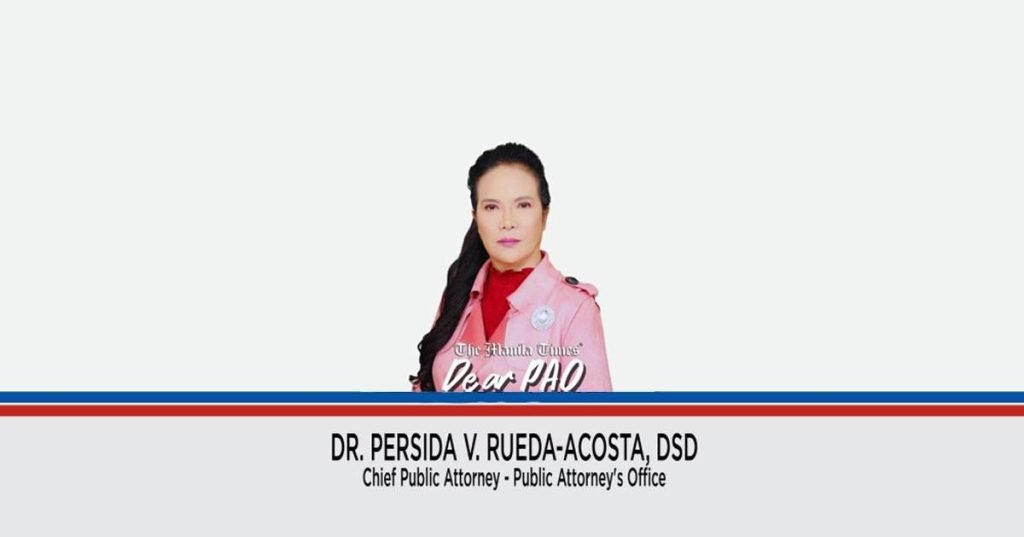
Dear PAO,
Tino was a politician in our province, and he committed a crime against my brother, resulting in his imprisonment (reclusion perpetua). Many years have passed since I last heard any information about him. Recently, his father, the incumbent mayor, claimed that he is retiring soon and his son will replace him because he will be released through pardon. I immediately researched about pardon under the Revised Penal Code of the Philippines, and I understand that even if he is pardoned, he cannot run for an elective position because of the absolute disqualification attached to the penalty of reclusion perpetua. Is my understanding correct? Further, am I correct in my assumption that pardon cannot be granted to Tino because his penalty is reclusion perpetua?
Bingo
Dear Bingo,
The power of the President to grant pardon or clemency emanates from Section 19, Article VII of the 1987 Philippine Constitution, which provides that:
“Except in cases of impeachment, or as otherwise provided in this Constitution, the President may grant reprieves, commutations and pardons, and remit fines and forfeitures, after conviction by final judgment.
“He shall also have the power to grant amnesty with the concurrence of a majority of all the Members of the Congress.”
In Monsanto v. Factoran, Jr., GR 78239 Feb. 9, 1989, the Supreme Court, through Chief Justice Marcelo Fernan, defined pardon as “an act of grace, proceeding from the power entrusted with the execution of the laws, which exempts the individual, on whom it is bestowed, from the punishment the law inflicts for a crime he has committed.”
There are also two provisions in the Revised Penal Code of the Philippines, as amended by Republic Act (RA) 10951, which may govern the issues raised in your letter, to wit:
“Article 36: A pardon shall not work the restoration of the right to hold public office, or the right of suffrage, unless such rights be expressly restored by the terms of the pardon.
“A pardon shall in no case exempt the culprit from the payment of the civil indemnity imposed upon him by the sentence.
“xxx
“Article 41: The penalties of reclusion perpetua and reclusion temporal shall carry with them that of civil interdiction for life or during the period of the sentence as the case may be, and that of perpetual absolute disqualification which the offender shall suffer even though pardoned as to the principal penalty unless the same shall have been expressly remitted in the pardon.”
A cursory reading of the aforecited provisions of the Constitution and Revised Penal Code of the Philippines, as amended, would reveal that pardon cannot be granted to those who were sentenced to reclusion perpetua. The correct interpretation of Articles 36 and 41 of the Revised Penal Code was elucidated in Risos-Vidal and Lim v. COMELEC and Estrada, GR 206666, Jan. 21, 2015, where the Supreme Court, speaking through Associate Justice Teresita Leonardo-De Castro, stated that:
“For this reason, Articles 36 and 41 of the Revised Penal Code should be construed in a way that will give full effect to the executive clemency granted by the President, instead of indulging in an overly strict interpretation that may serve to impair or diminish the import of the pardon which emanated from the Office of the President and duly signed by the Chief Executive himself/herself. The said codal provisions must be construed to harmonize the power of Congress to define crimes and prescribe the penalties for such crimes and the power of the President to grant executive clemency. All that the said provisions impart is that the pardon of the principal penalty does not carry with it the remission of the accessory penalties unless the President expressly includes said accessory penalties in the pardon. It still recognizes the Presidential prerogative to grant executive clemency and, specifically, to decide to pardon the principal penalty while excluding its accessory penalties or to pardon both. Thus, Articles 36 and 41 only clarify the effect of the pardon so decided upon by the President on the penalties imposed in accordance with law.”
Applying the above-quoted decision to your situation, the president’s plenary power to grant pardon or executive clemency is clearly recognized. Thus, even if Tino was penalized with a penalty of reclusion perpetua, he may still be granted pardon as this is the prerogative of the president. Articles 36 and 41 of the Revised Penal Code of the Philippines only clarify the effect of pardon, stating that the pardon of the principal penalty like reclusion perpetua does not automatically carry the remission of the accessory penalty of absolute disqualification unless the president clearly states that the latter is also remitted in the pardon. Thus, an accessory penalty of absolute disqualification to hold public office stands unless it is not expressly remitted in the pardon.
We hope that we were able to answer your queries. Please be reminded that this advice is based solely on the facts you have narrated and our appreciation of the same. Our opinion may vary when other facts are changed or elaborated.
Editor’s note: Dear PAO is a daily column of the Public Attorney’s Office. Questions for Chief Acosta may be sent to [email protected]






